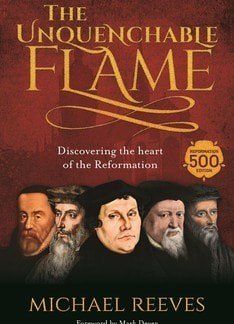How easy it is to hear of certain great events in the story of the Christian church and yet be unsure of the exact place of that event in the grand drama of God’s unfolding purposes.
This year sees the 500th anniversary of 31 October 1517, when Martin Luther nailed his 95 theses to the door of the Castle Church in Wittenberg. Little did he know what mighty things that one act would set in motion.
Luther was protesting against abuses in the sale of indulgences, which were supposed to reduce the time a departed soul must spend in purgatory paying for his sins. However, these sales only enriched the papal coffers in Rome. Luther’s act was the spark that set the mediaeval Catholic church aflame with indignation and led on to the world-shaking event known as the Reformation.
Dr Michael Reeves’ popular account The unquenchable flame has now been reissued to commemorate the 500th anniversary of that day. Here we have the gripping, fast-moving story of God’s interventions, from the early 13th century to the end of the Puritan era, finishing with the death of John Bunyan in 1688. Throughout the book we are given a generous sprinkling of black and white illustrations.
After a brief account of the mediaeval church, Dr Reeves leads on to a portrayal of Martin Luther himself, ‘God’s volcano’; then to such contemporaries as Zwingli and Menno Simons. The following chapter, on John Calvin, entitled ‘After darkness, light’, corrects many misconceptions levelled against the Genevan reformer. He emerges as a warm-hearted, if shy, theologian, writer and teacher — a far cry from the hard, single-minded man obsessed with predestination.
The Reformation of the English church is covered in a chapter entitled ‘Burning passion’, well named because it races through Henry VIII’s dramatic reign, with the break of the church from domination by the pope, on into the hopeful days of the boy-king Edward VI’s short reign.
We are then told of the fearful attempts of Mary Tudor to stamp out the Reformation by sending over 300 to an agonising death at the stake, because they would not renounce the biblical principles they held dear. The chapter ends as the young Queen Elizabeth I settles the church as Protestant, albeit with a degree of compromise which could not finally satisfy all her subjects.
Dissatisfaction with the Elizabethan Settlement leads Dr Reeves on naturally to explain the rise of the Puritan movement, through the reigns of Elizabeth, James I and Charles I, to the grievous bloodshed of the Civil War, and the Protectorate under Oliver Cromwell.
This is followed by the nation’s reaction as Charles II is invited back to the throne, a period in which evangelical church leaders are ‘ejected, gagged and suppressed’ to such an extent that the Reformation period is effectively over. All this complex history is told in an engrossing, page-turning style.
This book is a colourful must-read for any wishing to obtain a sweep of this vital period of church history. But Dr Reeves leaves us with one further provocative chapter, in which he asks, ‘Is the Reformation over?’ We are treated to a masterly survey of the final fallout from the Reformation and then asked to search our own hearts as to our attitudes today to the very truths for which so many godly Christians were prepared to sacrifice and even die.
Faith Cook
Breaston







